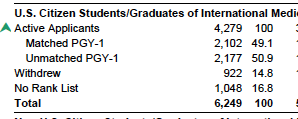Is it possible? What are my chances of getting in? Is all this money and effort going to be worth it? Can I finally be a doctor in the US?
These were the questions I used to ask myself everyday when I was thinking of taking the USMLE, and even while I was studying for the USMLE steps.
It is a difficult question. I can only try to answer you using some statistics.
The above data shows the number of positions offered by each specialty, and how many of it is taken up by U.S. medical graduates. Lets discuss a few common specialties which most of us Malaysians are interested in.
Internal Medicine
If you look at internal medicine, there are about 5,000 positions offered, and the U.S. graduates only take up 55.7% percent of these positions. This means that about 2,000 (40%) foreign medical graduates managed to get a position in Internal Medicine in 2012.
General Surgery
There are a total of 1,100 positions being offered for categorical (5-year program) and 1,200 for preliminary (1-year program where you need to re-apply the following year). Out of these, foreign medical graduates take up about 200 (20%) categorical spots and 700 (60%) preliminary spots.
So it seems that there are quite a number of positions taken up by foreign medical graduates in the U.S. Now lets take a look at what does statistics tell us about "chances".
Looking at the data, we can see that the chances of matching is about 40%. To simply put it, about half of those who applied will be successful, and half won't.
Now the big question is :
What are the factors which determines who gets a position and who doesn't?
After I completed my USMLE steps, I started preparing for the "Match" - which is the process whereby one gets "matched" into a residency position. This involves submitting my scores, my CV and other various documents, flying to the U.S. for interviews, and finally ranking the programs which I liked (and having the programs rank me as well).
I also bought a couple of books about this "Match" process. Based on my research, the top 2 reasons which are important for the program directors (people who will hire you) when they look at a
foreign grad are :
No. 1) USMLE Scores
No. 2) English proficiency during interview
No doubt there are other smaller factors as well, but the above are the top 2. I am not surprised by the 1st factor. USMLE scores is the only way these program directors can objectively judge your knowledge level. However, I was initially quite taken aback by "English proficiency". My reasoning was : if one can pass the USMLE steps, shouldn't they already possess adequate "English"?
Only during my trip to the U.S. for interviews did I understand why. In some of the programs which I interviewed at, there were a lot of other foreign graduates as well. They come from India, Middle East, China and various other countries, and they can be really hard to be understood. Their writing is excellent, but when it comes to speaking, we Malaysians have a huge advantage. We are lucky that we communicate to each other a lot in English. We should also be thankful that our ward rounds and patient notes are all in English. The most frequent comment I received while I was interviewing was "
Wow, you can speak really good English!" - and that was even while I was speaking in our normal Malaysian accent.
So actually, the biggest hurdle is one's USMLE scores. If you score poorly, it is going to be really difficult to get a position. I spent a lot of time to come up with a solid study plan and study materials for myself. I am also thankful that I studied hard for the USMLEs. All my sacrifices paid off in the end.
There is no short cut to get to the U.S. for residency training. You need to put in your time and effort, and make sacrifices in terms of your leisure time. One thing about the U.S. as long as you are willing to work hard, nothing will stop you from getting what you want. Not even race or nationality. In fact, let me show you one last data.
5% of US medical graduates and 50% of Americans who trained outside of USA don't get matched (means they don't get a spot).
You may be thinking, "What? But they are American citizens! Why didn't they get a spot?"
The answer is because, program directors want the best, regardless of ones citizenship. Their spot were taken by stronger applicants, who are foreign medical graduates. It is not about your citizenship, whether you are a "European Union citizen" like in the UK, or whether you have a "Permanent Resident status" like in Australia. This is America, the land of immigrants and opportunities. Program directors hire the strongest applicants, regardless of their citizenship status.
The final question is : Can you be the one that they are looking for?
- Jamie -
Tags : what are my chances, working as doctor in USA, residency, specialization in USA, doctor, USMLE, Kuala Lumpur, Malaysia








